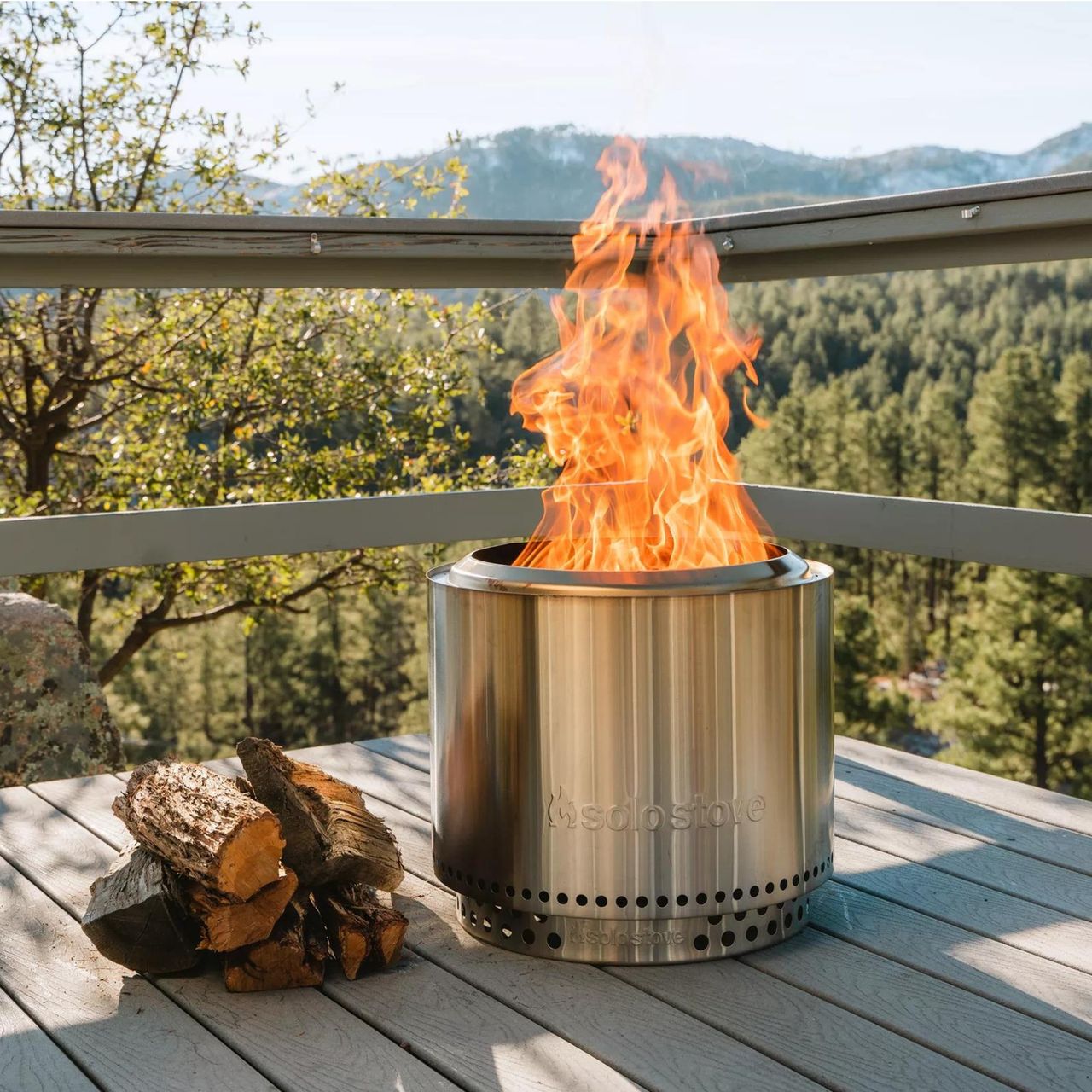
As someone who loves camping and entertaining outdoors but has never been able to stomach the stench of stale smoke, I was excited to put the Solo Stove Bonfire 2.0 through its paces in my own garden two years ago. We’ve had a regular bowl-shaped steel firepit for as long as I can remember, but, living on a fairly exposed site within sight of Dartmoor (and all the strong winds that roll off it), smoke-filled eyeballs have always been a common gripe.
Billed as ‘the fire pit of the future’, Solo Stove's Bonfire fire pit is a strong contender for one of the best fire pits due to its main USP: it is smokeless. If you’ve ever huddled around a fire pit and experienced the clinging, cloying smell of smoke that lingers in your hair and clothing long after the last embers have died down, you'll know what a big selling point this is.
Solo Stove sell three fire pits, which claim to be the best smokeless fire pits you can buy. The Solo Stove Bonfire 2.0 is a mid-sized fire pit that can fit 4-6 people around, and is the brand's bestselling fire pit. If you are looking for a smaller option, the smallest (and cheapest) version, the Solo Stove Ranger, received 4 and a half stars in our review.
When I first tested this fire pit in 2023, I was keen to find out how it was to light and keep burning, and whether or not it produced sufficient heat to keep us cosy in the garden while we roasted marshmallows with the kids, read the Sunday papers, and chatted with friends. Plus, of course, there were those smokeless claims to put to the test.
Since then, I have taken the fire pit on camping trips, and it has seen plenty of marshmallows toasted. I've updated this review to reflect my first impressions, along with how well the fire pit has lasted. I'm happy to report it is still going strong and is ideal for keeping the chill off on an early spring evening or la ate summer night.
Solo Stove Bonfire 2.0 specifications
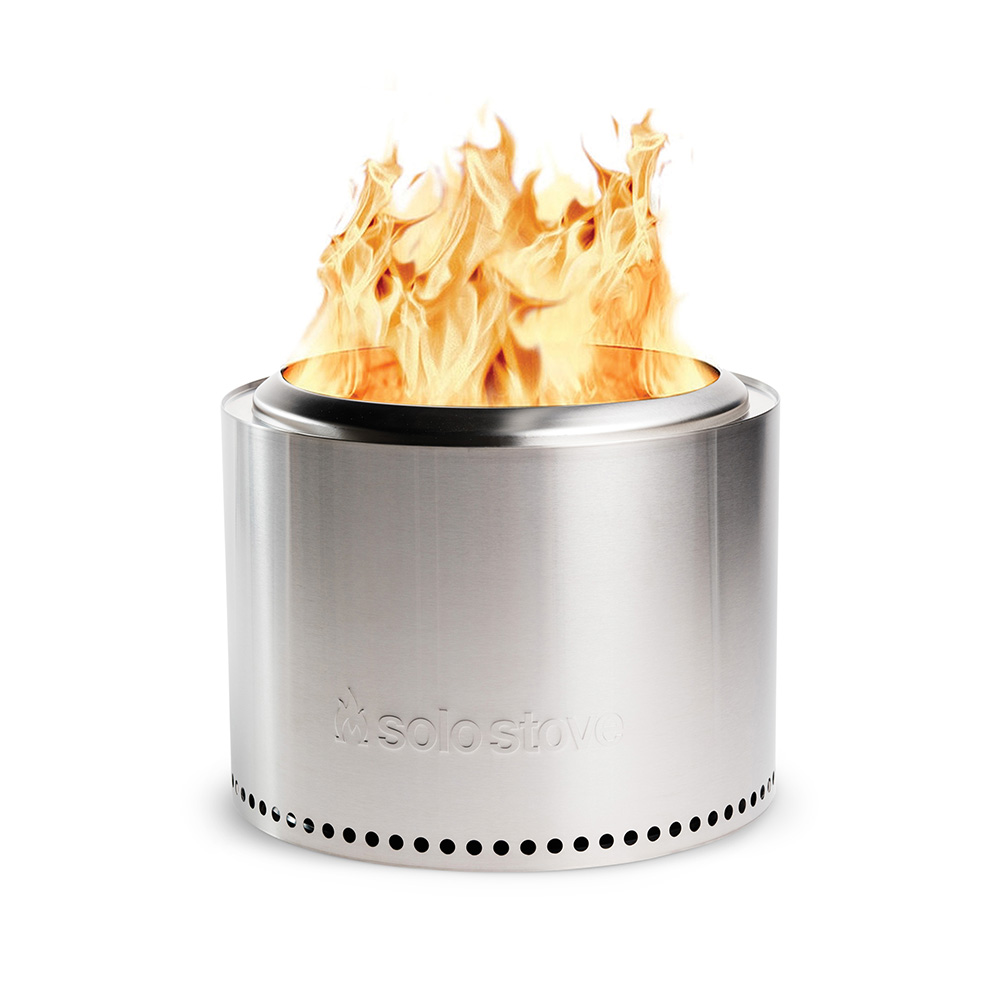
- Fuel: Wood burning
- Size: H35.5cm x Dia. 49.5cm
- Weight: 10.6kg
- Construction: 304 stainless steel
- Accessories: Removable ash pan and carry bag
- People: Up to 6 people can fit around it
- Warranty: Lifetime
Who tested it?
What’s in the box?
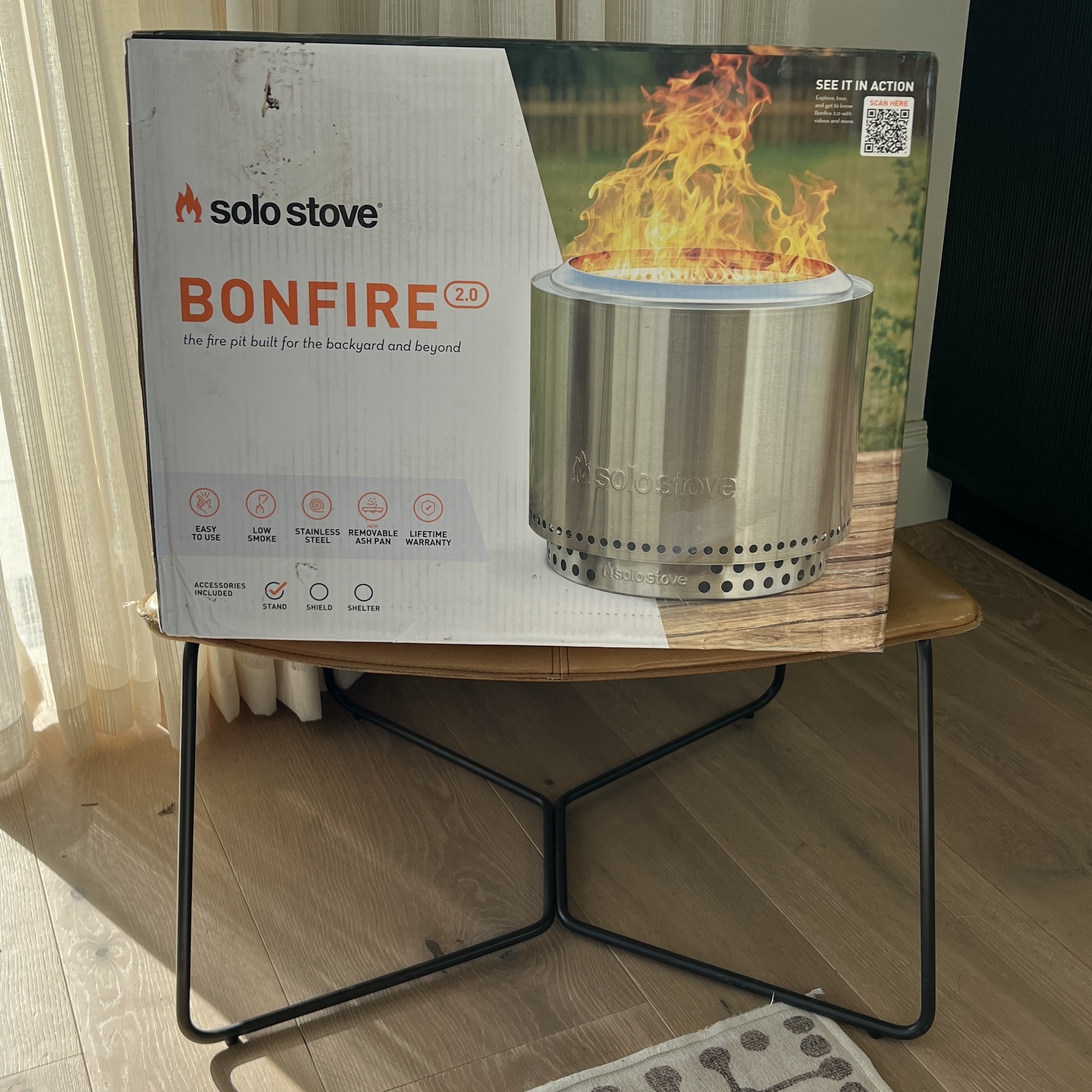
The Solo Stove Bonfire 2.0 arrived in a substantial box, which included the main bonfire unit plus an initially perplexing array of metal parts and a thick, black carry bag. The packaging is a bit plastic/polystyrene heavy for my liking, but everything arrived safe and damage free.
First impressions were good; it is clearly well made and looks smart and modern. I was getting Brabantia vibes in terms of its clean, fuss-free lines! Most fire pits are made of some form of metal, and are therefore never feather-light, but this was certainly one of the heavier fire pits I have come across.

Setting up the Solo Stove Bonfire 2.0
This fire pit was easy enough to put together using the two A4 print-outs supplied (one for the main bonfire and one for the stand), which featured handy pictures. The largest metal ring with holes is the stand, which is designed to protect heat-sensitive surfaces, like decking, and grass from heat damage. It also adds a nice bit of height.
Next, you need to pop the ash pan in the bottom, with the base plate centred on top. There’s also one more metal ring, the flame ring, to slide into place on the top lip of the Bonfire 2.0. This ring has angled edges that help funnel flames and smoke away from your face.
The carry bag is substantial and doubles as a cover once the Bonfire 2.0 has fully cooled. I didn’t find it very easy to get the Bonfire 2.0 into the bag without assistance, but once in, it’s definitely easier to carry. Because of its weight, I wouldn’t want to schlep it very far though!
Lighting the Bonfire 2.0 is the same as lighting a woodburner indoors, or any other fire for that matter. Apart from a decade renting in various cities, I’ve always lived in the country, in homes featuring some form of wood fire. This meant I didn’t need Solo Stove’s fire lighting instructions but they’re fairly standard, and I was glad to read I’ve been doing it right all these years.
The main point to note is that you should not overfill the Bonfire 2.0. If the wood/kindling sits higher than the upper vent holes (inside the rim) you will stuff any hopes of smoke-free burning and it’ll also compromise the airflow burning system, too.
I started by laying small pieces of kindling in the bottom of the pan, on scrunched up newspaper, then added a couple of smaller pieces of wood. Next, I lit the newspaper and waited for the flames to catch on before adding a log or two. I was impressed how quickly and easily the kindling caught and was pleased I didn’t have to burn any precious (smelly) firelighters to get it going. In mere minutes, there was a very pretty rolling flame effect going on.

What is the Solo Stove Bonfire 2.0 like to use?
On the first outing of the Solo Stove Bonfire 2.0, we all pulled our deckchairs up (the outdoor furniture still being in storage) to get closer to the heat. Our little family of four huddled around and the heat output was sufficient to keep us cosy, even in early March. Admittedly with our coats firmly on.
On a summer’s evening, I would imagine Solo’s claim that six people can enjoy its warming glow is accurate as we could sit further back. If you regularly entertain bigger crowds, you may be better off considering the brand's bigger fire pit, the Solo Stove Yukon 2.0.
Alternatively, there is also the option of buying a Solo Stove Bonfire 2.0 heat deflector to increase the heat radius. This added extra is designed to push the heat out and down (rather than up into the ether) to warm more bodies and/or make it more suitable in colder seasons; however, it retails at a rather staggering £209.99. Refuelling the fire doesn’t look as easy when the deflector is on as you’ll need to push kindling through the gaps, but I didn’t test one so I can’t vouch for whether it's worth the extra investment.
Once lit, the rolling flame action is superb. It reminded me of the air-wash secondary combustion thing that goes on inside our indoor woodburner, to keep the glass clean. Everyone who saw our Solo Stove Bonfire 2.0 in action ooohed and ahhhed at the pretty flames, which are snake-charmer-grade mesmerising. Whether it translated to heat output is harder to prove or quantify, but as mentioned earlier, we were indeed heartily warmed by the Bonfire 2.0, and it certainly didn’t appear to be lacking on the heat front.
Once it was up and running, keeping the fire burning was very easy, and it didn’t burn through the fuel too speedily either, which was a huge bonus given how much the price of logs has increased this year. Because the fuel sits deep inside, it doesn’t spit or flare as some bowl-shaped pits can, and the fire pit stand, which is vented, should prevent any heat damage to surfaces like decking and grass.
In terms of safety, the Solo Stove Bonfire 2.0 requires the usual precautions you’d take with any fire pit. Pets need to be kept well away – our spaniel very nearly burnt his nose on it – and children must also be taught to keep clear. Because the fuel sits deep inside, it doesn’t spit or flare like some bowl-shaped pits can. The fire pit stand, which is vented, should prevent any heat damage to surfaces like decking and grass.

Is the Solo Stove Bonfire 2.0 really smokeless?
But is the Solo Stove Bonfire 2.0 really smokeless? This has to be the million-dollar question and the answer, from me, is yes. And no.
First for the science bit. Solo Stove’s smokeless situation works via secondary burn, made possible thanks to its double-skin steel construction with vent holes at the top and bottom. Cool air is pulled through the bottom, heats up within the double cavity, and rises to the top, which invokes secondary combustion as the hot air exits the top vents.
This continuous supply of air and rolling flame effect results in more thorough combustion and a hotter fire with less smoke. The rim at the top of the bonfire is also angled to help control smoke flow.
When we tested the Solo Stove Bonfire 2.0 on a more inclement day – when there were mild Spring-time winds but nothing that would dry your sheets in record time – the firepit was more or less smokeless, but, on the days when we tested it when the wind appeared to be coming from three directions – as it often does here on the edge of Dartmoor – its smokeless powers failed somewhat.
My main – and completely unscientific – test for the presence of smoke basically came down to whether or not I had to wash my hair before bed! I can’t stand the smell of smoke-filled hair, and on those windier days, I did have to take a shower.
It’s also worth noting that, no matter what the wind was up to, the smokeless action does take a little time to kick in. We found it took at least 10 minutes to die down. Solo Stove recommends allowing 5-15 minutes for smoke to dissipate after lighting. So don’t expect to see zero smoke from the first strike of a match, even on a calm day, the wood really needs to have caught on properly, and be sitting well under the top vent holes of the bonfire before the smoke emission becomes noticeably reduced.
That said, this firepit definitely produced less smoke than most on a calm day, and if your garden is more sheltered than mine then you're likely to find those billowing clouds of smoke almost eliminated.
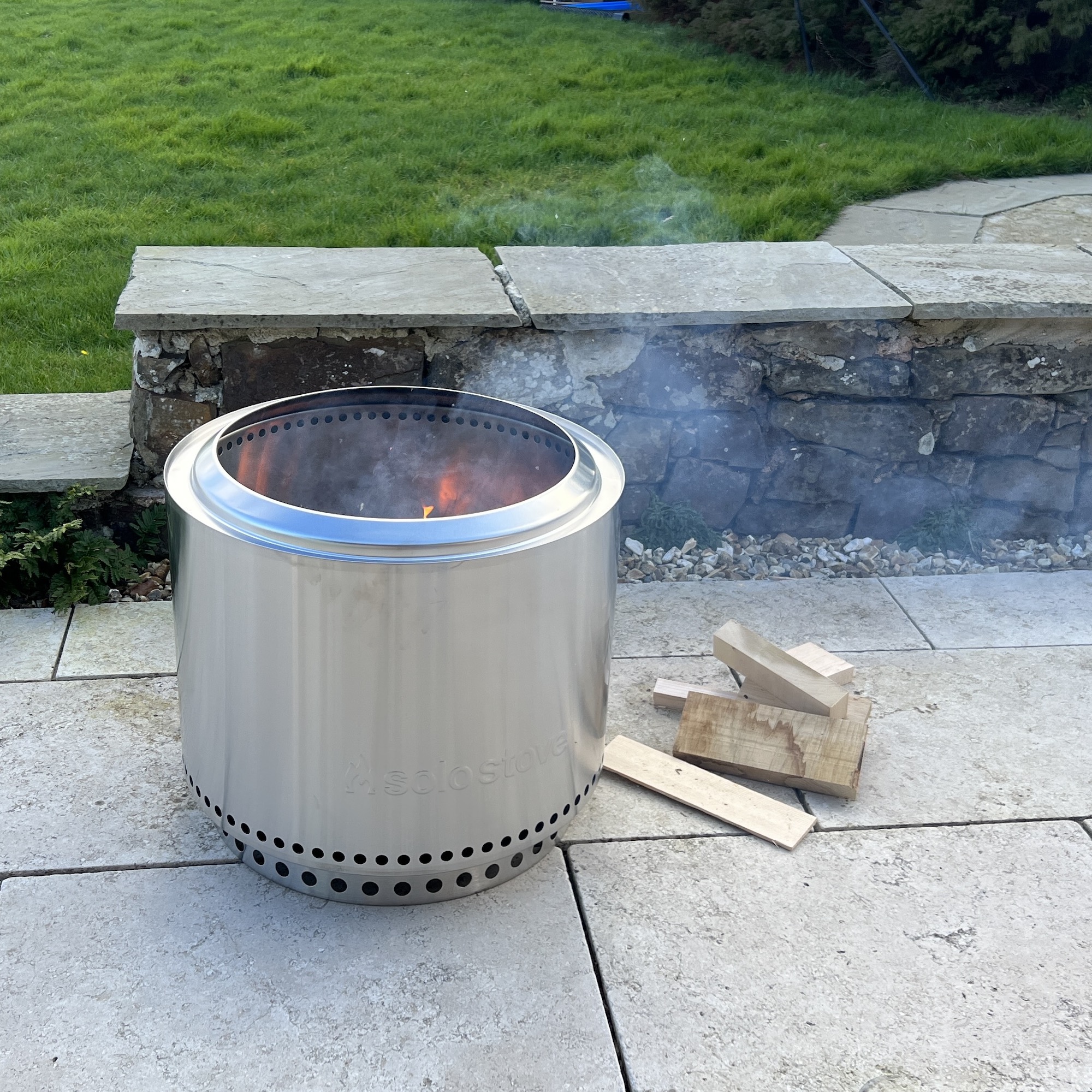
How portable is the Solo Stove Bonfire 2.0?
I’ve already mentioned that the Solo Stove Bonfire 2.0 is heavy, comparable to about seven bottles of wine or a one-year-old child, but it’s also unwieldy. There is no handle or grip holds so the only way to pick it up is to get your hands right underneath and lift it, or do a hug hold, like you’re carrying a watermelon (Dirty Dancing style). I guess you could also pincer grip it at the rim, if you have crab-like hand strength. But here’s the real rub; there is a handle, you’ll just need to stump up an extra £39.99 to get it. On a fire pit that costs just shy of £250, some form of handle should be included, surely?
OK, assuming you can manhandle it into the carry bag (that is included) – and you’ll need two people to do so – the Solo Stove Bonfire 2.0 does become more portable. The carrying straps are very robust and my husband, Nick, could handle the weight of it, as long as he wasn’t expected to carry much else. He said the handles would be better if they were twice as long, so he could put them over his shoulder. The shortness of the handles meant he had to hold it like you would a carrier bag, with the Bonfire smacking into his ankles. We considered taking it to the beach, but were put off when we remembered how far the parking is from the sand.
If portability is key for you then the smaller Solo Stove Ranger 2.0 smokeless firepit could be the solution.
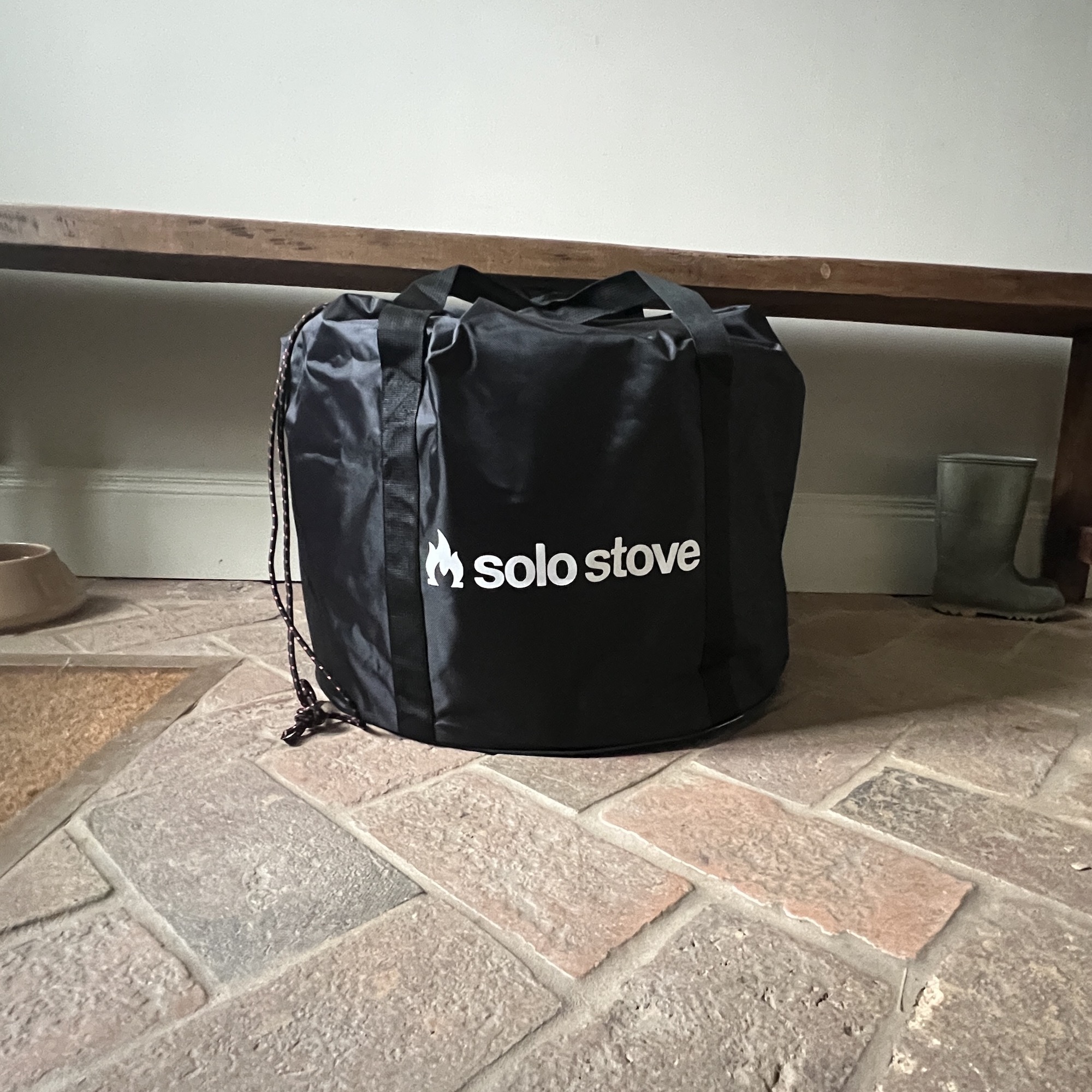
Cleaning the Solo Stove Bonfire 2.0
I was pleasantly surprised how little ash was left in the pan, even after several hours of use. To clean the Bonfire 2.0, I just brushed any remaining ashes through the holes on the base plate, then lifted the base plate out and removed the ash pan to empty. It did leave a few patches of ash behind in the base, so I then up-ended the bonfire on the compost heap and shook it out (again, handles would have been handy).
As the exterior of the bonfire stays clean, you don’t get messy hands when carrying it after use, as long as you avoid the underside of the flame ring that sits on the rim because it gets coated in a layer of black sooty residue during use. I didn’t know to avoid it the first time but soon learnt my lesson.
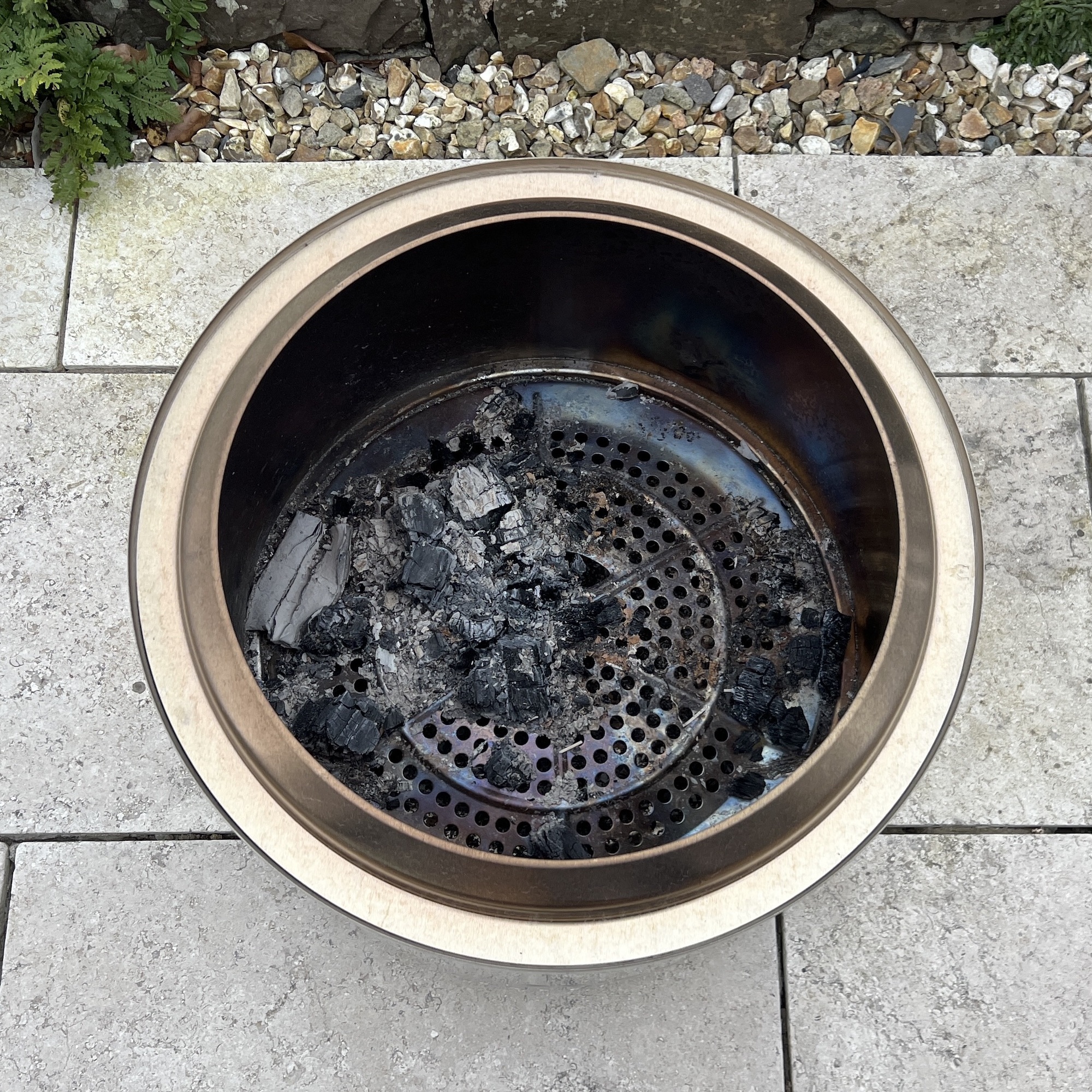
Maintaining and storing the Solo Stove Bonfire 2.0
There doesn’t appear to be any maintenance required, but, according to the care guidance, you should expect the steel to discolour and patina over time. I actually quite liked the bronzing effect. You can use the carry bag supplied to protect the Bonfire from the elements when left outside over summer, but it does need to be properly protected from moisture and rain in winter to avoid rust damage.
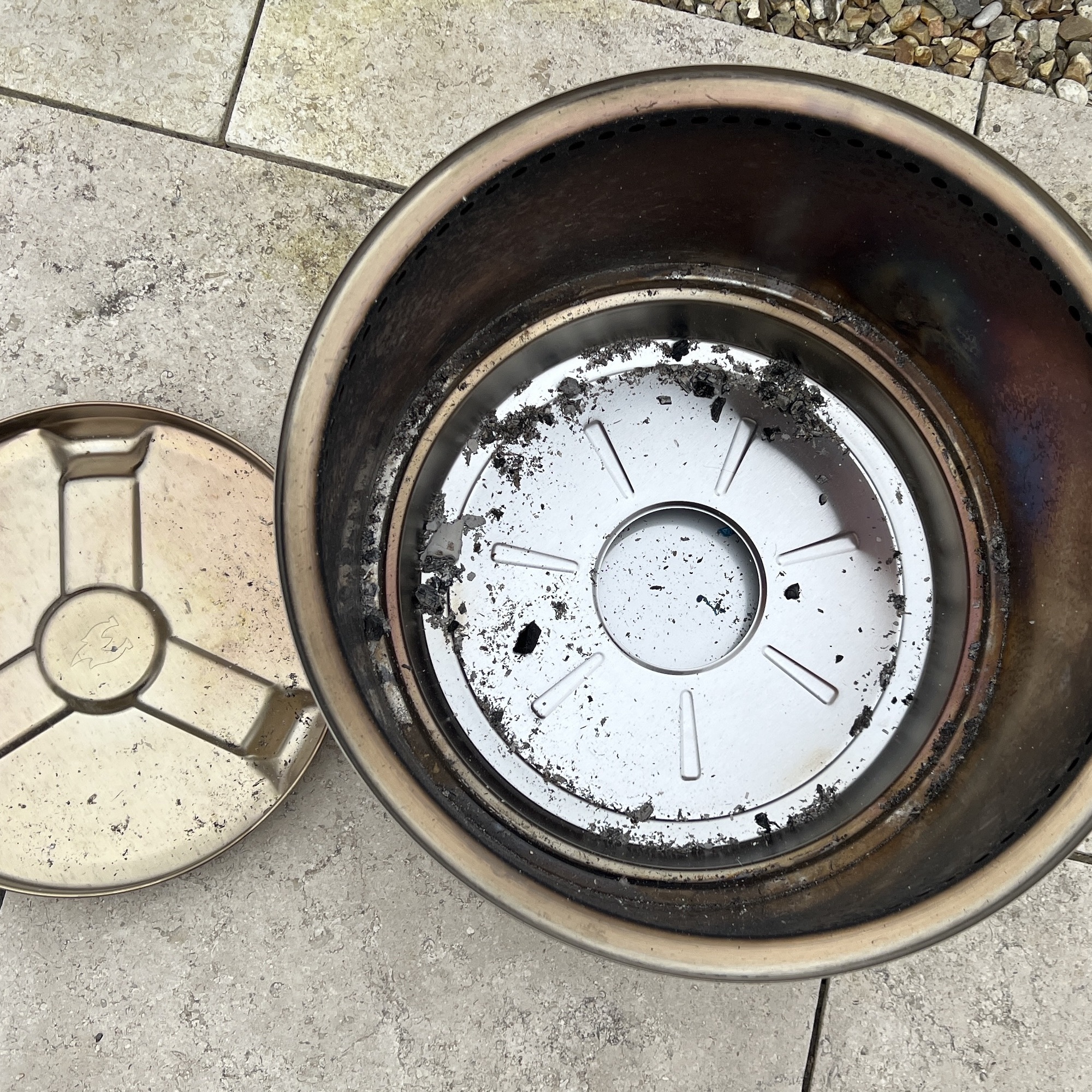
2 years later update
We’ve had our Solo Stove 2.0 for just over two years now, and after a solid run last summer, this June marked its first outing of 2025. It had been tucked safely away in its bag in the garage all winter and emerged a bit dusty, but with not a speck of rust in sight. We took it camping to Bigbury (South Devon) with our NCT gang on a damp, drizzly weekend, and it totally earned its keep (and possibly made me the most popular person on the trip!).
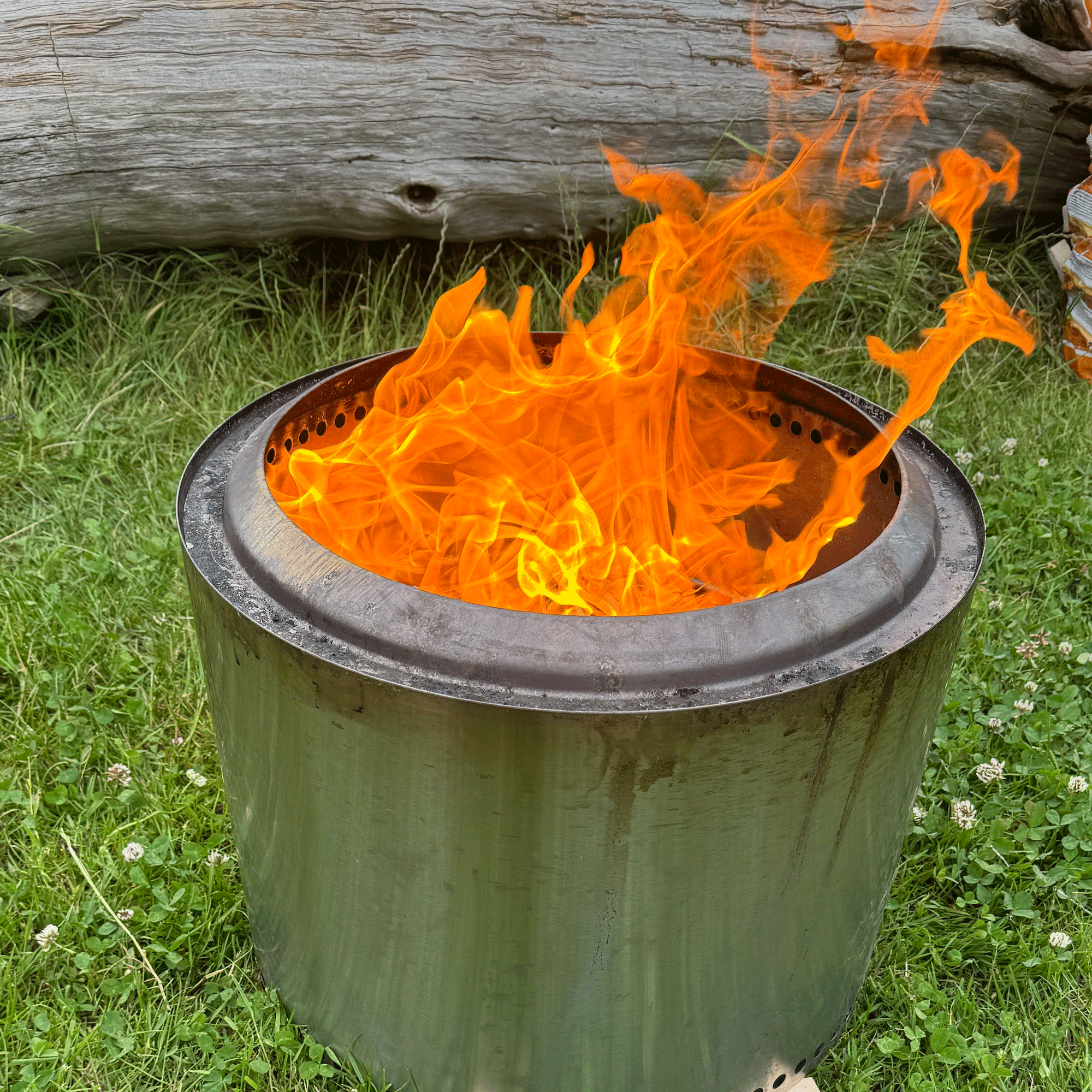
Even without the official grill attachment, we made do with a grate from an old kettle BBQ and managed to cook up a feast of burgers and sausages for all in two-three batches. It wasn’t the neatest job, grease ran down the sides and left a few marks, but I’m not precious about it. It’s a firepit, not a coffee table. The rim’s picked up a bit of heat tarnish too, but the rolling flame effect still looked as mesmerising as ever, and more importantly, kept us toasty in our Crocs and Dryrobes well into the night.
Functionally, it’s held up brilliantly. No rust, no warping, and both the charcoal and logs burned evenly and efficiently – enough to keep the fire going without constantly topping it up. All in all, it’s aged like a pro. Sure there’s some cosmetic wear now but performance-wise it is still an absolute hero.
How does the Solo Stove Bonfire 2.0 rate online?
There is a huge fanbase for the Solo Stove Bonfire 2.0 online, and it’s quite hard to find anyone with a bad word to say about it. The main love is for its smokeless powers, but people also rave about its design and how perfect it is for smaller gardens and patios.
On Amazon, it gets 4.6 out of five stars, and nearly all the (precious few) negative reviews were about dents presumably made during transit. I was slightly smug to note a couple online customers did share my disbelief over its lack of a handle.
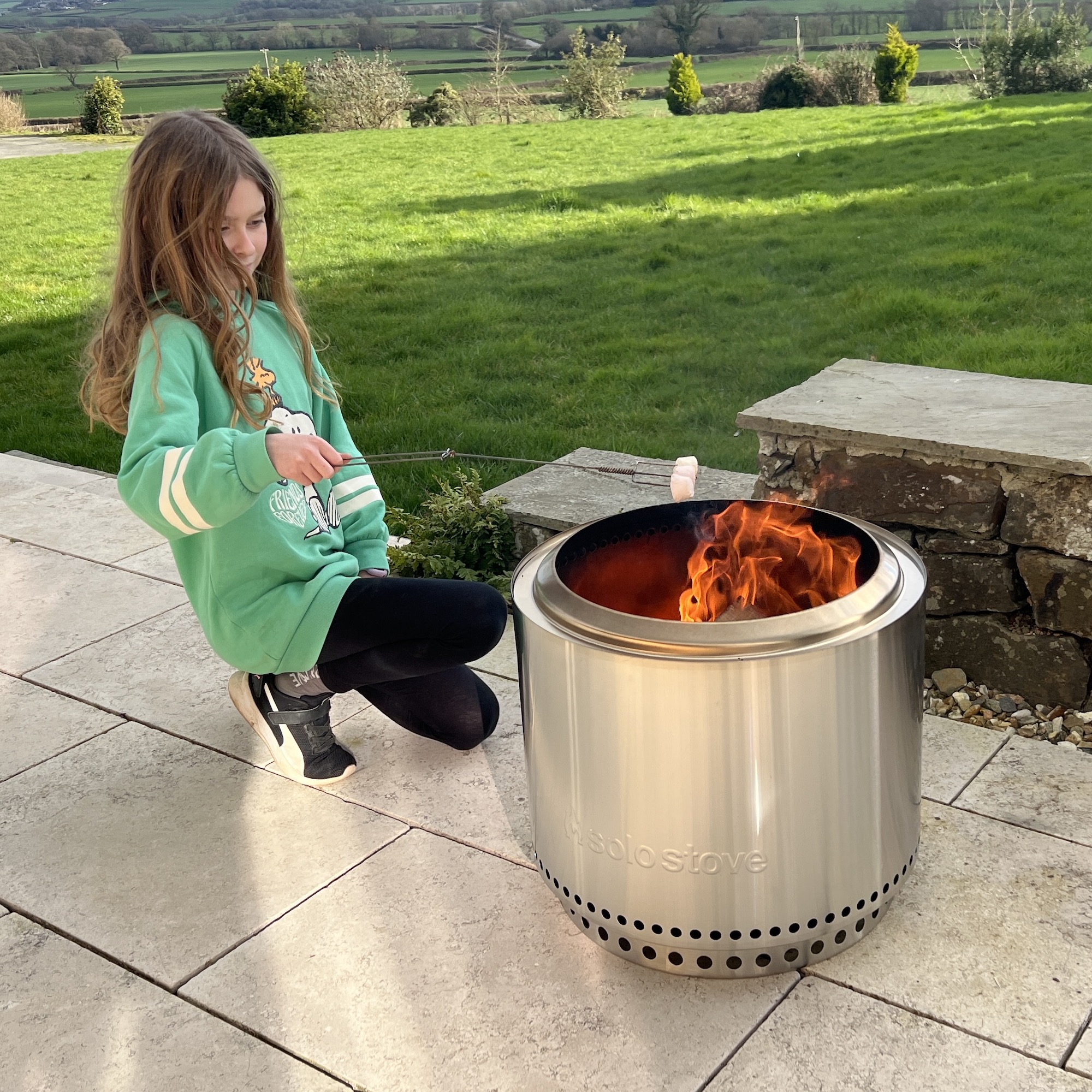
Should you buy the Solo Stove Bonfire 2.0?
You should buy the Solo Stove Bonfire 2.0 if you want a near-smokeless, efficient burn, value high build quality with a lifetime guarantee, and are willing to pay a premium for all of these features.
You shouldn't buy the Solo Stove Bonfire 2.0 if your primary concern is maximum heat output, you're on a tight budget, or you prefer a more traditional, higer-smoke fire pit experience.
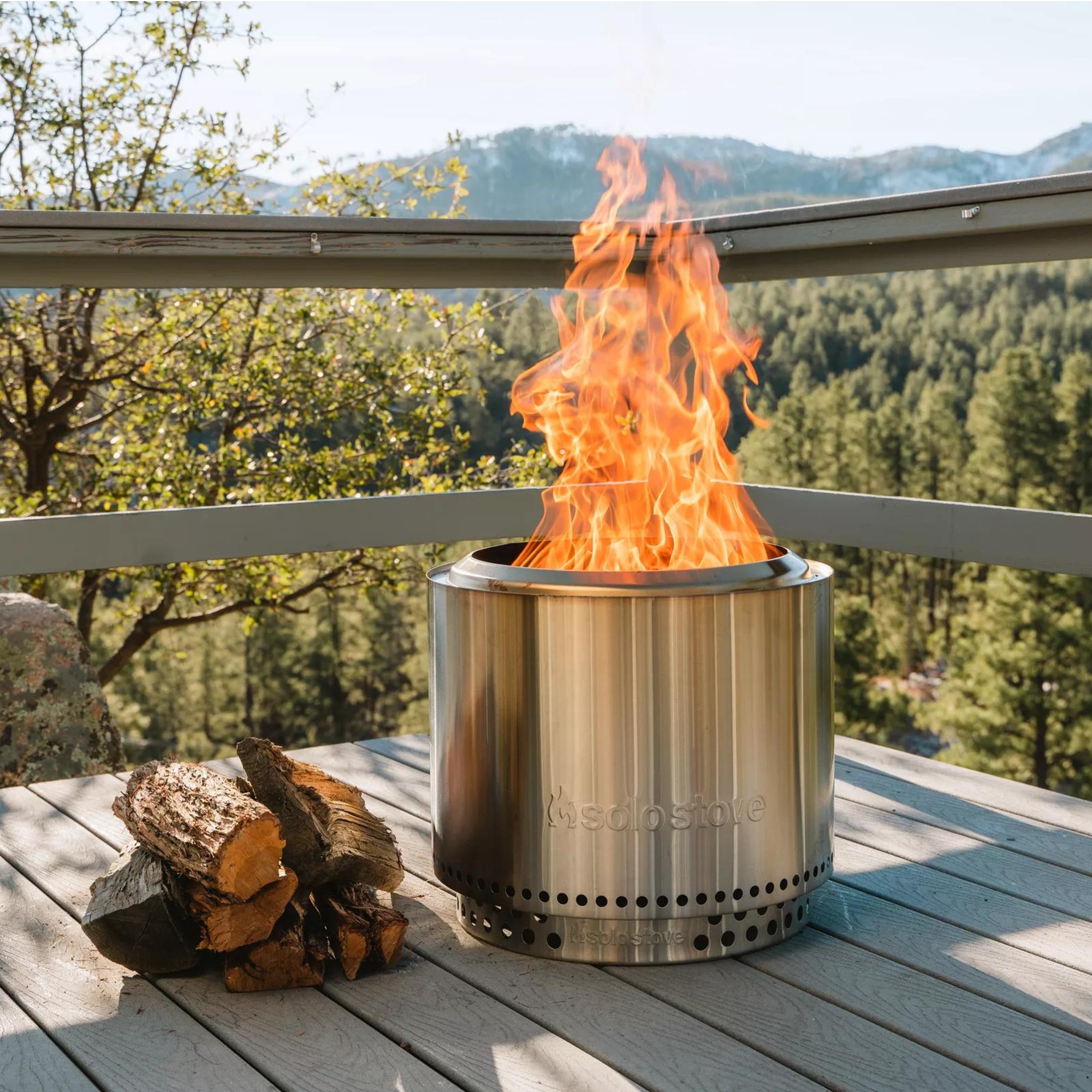
How does it compare to similar models and its predecessors?
This is the second edition of Solo Stove’s Bonfire, hence the 2.0, and the main improvement was the addition of the removable ash pan. Previously ash-emptying involved picking the fire pit up and tipping it upside down, which sounds messy and muscle-straining. Solo Stove also makes the Ranger, a smaller, more portable model, and the Yukon, which is aimed at larger gatherings. All three bonfires are essentially the same in all but dimensions, and all promise reduced smoke emissions.
There are a few other fire pits offering low smoke burning, all using a similar double-cavity airflow system, but Solo Stove’s main competitor is probably the TIKI Low Smoke Fire Pit, which is even more expensive but, arguably, better looking. The ash is accessed via a drawer, making it a breeze to empty, and it also comes with a stand and cover, but no carry bag.
Compared to our regular and much bigger, single skin, fire pit I did find that the Solo Stove did not push out quite the same levels of heat that our does, but I’ve read that’s the payoff when considering any low smoke fire pit. The double cavity required to achieve those mesmerising rolling flames, and the smoke reduction inadvertently acts as heat insulation.
After two years with my Solo Stove Bonfire firepit, I’ve no plans to replace it any time soon. Here’s to many more summer adventures, preferably with a little less drizzle.







